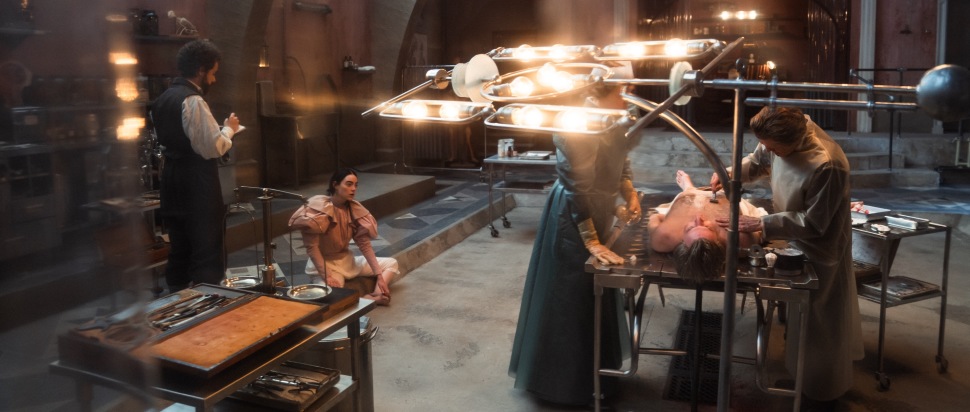Hold the Scotch: Poor Things, Lanthimos, Gray and Scotland
The prospect of Yorgos Lanthimos adapting Poor Things has been mouthwatering for Alasdair Gray fans. But by changing the setting from Glasgow to London, has the book's political message been lost?
Yorgos Lanthimos's latest film, Poor Things, starring Emma Stone, Willem Dafoe and Mark Ruffalo, has already been deemed a critical success following its US release in early December. However, Lanthimos may have missed a trick as his adaptation appears to largely overlook the Scottish significance of the original text.
Poor Things is based on the 1992 novel by celebrated Glaswegian writer and artist Alasdair Gray. The general plot focuses on Bella Baxter (played by Stone in the film) and her strange origins as a corpse resurrected by Dr Godwin Baxter (played by Dafoe with a wavering Scottish accent, the film's only direct nod to Gray's home nation). Bella is brought back to life by replacing her brain with that of her unborn foetus, thus making her a modern Frankenstein’s monster – a grown woman with an infant’s mind, who must relearn everything she previously knew about the world around her. Emma Stone has already spoken of the fascinating challenge Bella provided as a character. Yet, the book's original setting of Victorian Scotland is vital to fully understand the complexity of Bella Baxter as a character.
A fierce Scottish nationalist and enthusiast of Scottish history, Alasdair Gray’s art is inherently informed by his politics. Within the Poor Things novel, Gray includes an illustration of Bella Baxter titled 'Bella Caledonia'. This addition may appear strange at first but begins to make perfect sense when we consider Bella as a metaphor for the Scottish nation. Much like Scotland, Bella is simultaneously old and young – stripped of her history and violently forced to communicate in an unfamiliar language. As a woman, she is marginalised and exploited by her English counterparts.
This idea of duality is viewed as characteristic of Scottish literature. First coined in 1919, the concept of the “Caledonian antisyzygy” describes the union of opposites that is inherently Scottish. Literary critics claim that this is because Scotland is divided and imperfect. This is a recurring motif in Scottish texts – from James Hogg’s Confessions of a Justified Sinner (1824) and Robert Louis Stevenson’s The Strange Case of Dr Jekyll and Mr Hyde (1886) to Ian Rankin’s Rebus novels. Bella Baxter’s journey to enlightenment therefore becomes a commentary on the future of Scotland. Despite modern Scotland being in its infancy as a nation, like Bella it is extremely capable and fast-learning. Thus at its crux, Gray’s is a novel about what it fundamentally means to be Scottish and how nations are constructed in relation to their literature.
Dr Baxter’s manufacturing of humanity parallels the idea of the Scottish national identity as being invented and imagined. This idea of inauthenticity is abundantly obvious in Lanthimos’s adaptation, and the exaggerated fictional settings and costumes within the film are perhaps a nod to Gray’s contemplations on the infancy of Scotland as a nation.
However, the imagined otherworldly locations are intended to be more of an outward reflection of Bella Baxter’s psyche rather than an ode to Scotland. The novel's setting in the West End of Glasgow has been replaced by a fantasy steampunk wonderland plucked from Lanthimos’s imagination. In fact, Scotland isn’t present at all. Godwin Baxter’s residence has been displaced from Park Circus and planted in the middle of an imagined London. Although this may appear an insignificant plot point, this artistic choice destroys some of the significance of Gray’s text.
There is some irony to this creative choice. Through the vessel of Bella, Gray comments on the dilution and destruction of Scottish culture. In erasing the Scottish setting of the film, Lanthimos only reinforces Gray’s argument. Yet in removing the cultural context of the text and giving it ‘the Hollywood treatment’, Poor Things becomes less of a reflection on the dilemma of the Scottish nation, and more simply a surrealist commentary on the female experience. While Lanthimos’s film is a fascinating examination of what it is to be human, in changing the setting it does appear he’s robbed his film of a more layered political commentary.
This is not to say you shouldn’t go and see Poor Things. Undeniably, it's a wonderfully inventive and original film. And it's clear Lanthimos has great respect for Gray and his writing. In several interviews, the Greek director of The Lobster and The Favourite has talked fondly of the author, who he briefly visited in Glasgow to discuss the adaptation before Gray died in 2019. The scale of the production, the stellar cast, and the glowing early reviews all set Poor Things up to be a successful adaptation.
However, before we get caught up in the spectacle, I'd urge people anticipating the film to take the time to read Gray’s original text. Not only is it a literary and visual delight, but an understanding of the cultural importance of Gray's book will only add to the viewing experience as we realise the true significance of Bella Baxter.
Poor Things is released 12 Jan by Disney
